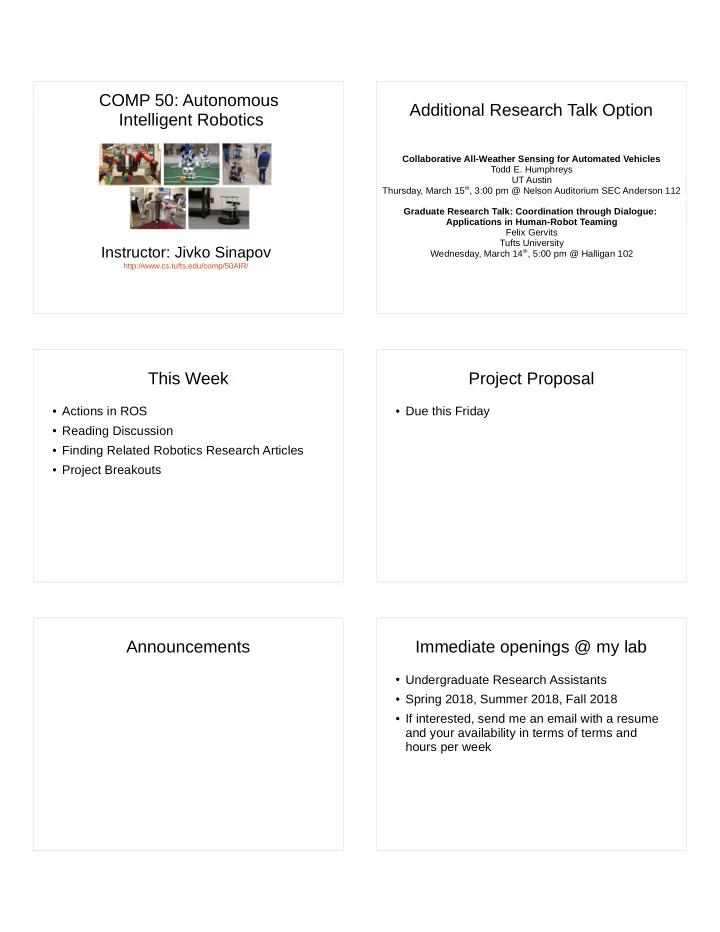

COMP 50: Autonomous Additional Research Talk Option Intelligent Robotics Collaborative All-Weather Sensing for Automated Vehicles Todd E. Humphreys UT Austin Thursday, March 15 th , 3:00 pm @ Nelson Auditorium SEC Anderson 112 Graduate Research Talk: Coordination through Dialogue: Applications in Human-Robot Teaming Felix Gervits Tufts University Instructor: Jivko Sinapov Wednesday, March 14 th , 5:00 pm @ Halligan 102 http://www.cs.tufts.edu/comp/50AIR/ This Week Project Proposal ● Actions in ROS ● Due this Friday ● Reading Discussion ● Finding Related Robotics Research Articles ● Project Breakouts Announcements Immediate openings @ my lab ● Undergraduate Research Assistants ● Spring 2018, Summer 2018, Fall 2018 ● If interested, send me an email with a resume and your availability in terms of terms and hours per week
The Project Readings Burgard, Wolfram, et al. "Experiences with an interactive museum tour-guide robot." Artificial intelligence 114.1-2 (1999): 3-55. + Augmented Reality Actions in ROS ● Main page: http://wiki.ros.org/actionlib ● Actions are like services but… – Can be interrupted while being executed – Can publish feedback to the client who called them over the course of execution Calling navigation actions from code What this may look like with Turtlebot... ● Let’s write a client that calls an action of type move_base_msgs::MoveBaseAction ● This is the default action for making the robot move to a (x,y, theta) goal in the map
ROS Action Demo (Part 2) Cartesian Theater ● Sending goals in the /map frame of reference ● Interrupting actions Overview of Github Repo Building 3D Models [From Arkin (1998)] Reading Discussion Vision-guided Behaviors O'Regan, J. Kevin, and Alva Noe. "A sensorimotor account of vision and visual consciousness." Behavioral and brain sciences 24.5 (2001): 939-973. [From Arkin (1998)]
J. Kevin O'Regan and Alva Noë [http://nivea.psycho.univ-paris5.fr/ASSChtml/ASSC.html] [http://nivea.psycho.univ-paris5.fr/ASSChtml/ASSC.html] [http://nivea.psycho.univ-paris5.fr/ASSChtml/ASSC.html] [http://nivea.psycho.univ-paris5.fr/ASSChtml/ASSC.html] [http://nivea.psycho.univ-paris5.fr/ASSChtml/ASSC.html]
Even Longer Scan Path [http://nivea.psycho.univ-paris5.fr/ASSChtml/ASSC.html] [http://nivea.psycho.univ-paris5.fr/ASSChtml/ASSC.html] Another Example [http://nivea.psycho.univ-paris5.fr/ASSChtml/ASSC.html] [http://nivea.psycho.univ-paris5.fr/ASSChtml/ASSC.html] Scan Path [http://nivea.psycho.univ-paris5.fr/ASSChtml/ASSC.html] [http://nivea.psycho.univ-paris5.fr/ASSChtml/ASSC.html]
Dreaming and Robots “I’m curious as to what would be an equivalent [to dreaming] for a robot? […] would it be possible to replicate the process of dreaming and mental imagery in a robot? As a human, the ability to mentally imagine a scene is very useful for preparing and planning and while it might not abide by the definition set in this article, the idea behind it could be applied similarly in robotics to allow robots to simulate their environments internally in a way that can help them for whatever tasks.” - Matthew [http://nivea.psycho.univ-paris5.fr/ASSChtml/ASSC.html] Vision vs. other senses “How would O’Regan and Noë define what “vision” is in robots in particular? Using human vision as a template for robot vision could in practice be very limiting. The line between “vision” and other senses blur together quickly in a robot. For instance, if a robot could detect magnetic fields does this count as “seeing” them? Similarly can robots “see” heat through infrared cameras? Do O’Regan and Noë believe their concept of vision applies to these extensions of vision in robots ?” - Amel [http://nivea.psycho.univ-paris5.fr/ASSChtml/ASSC.html] Discussion “A question I have now: is the general sense in the field of autonomous robotics that some problems might be answered or at least reworked from a new philosophical/conceptual perspective?” - Grant
Discussion Project Breakout II ● To what extent can theories and models from ● Use google scholar to find 2-3 published psychology help advance robotics? articles that are related to your project ● Create a shared document for your team to keep track of related research articles Finding Relevant Literature THE END ● Relevant robotics journals and conferences ● Using google scholar Project Breakout I ● Breakout into your project groups ● Think of the modules / components you need to write for your system to work – What are the inputs and outputs of each? – How will you make them talk to each other? Messages? Services? Or Actions? – How will you organize them into separate ROS packages? – Setup a github repository
Recommend
More recommend